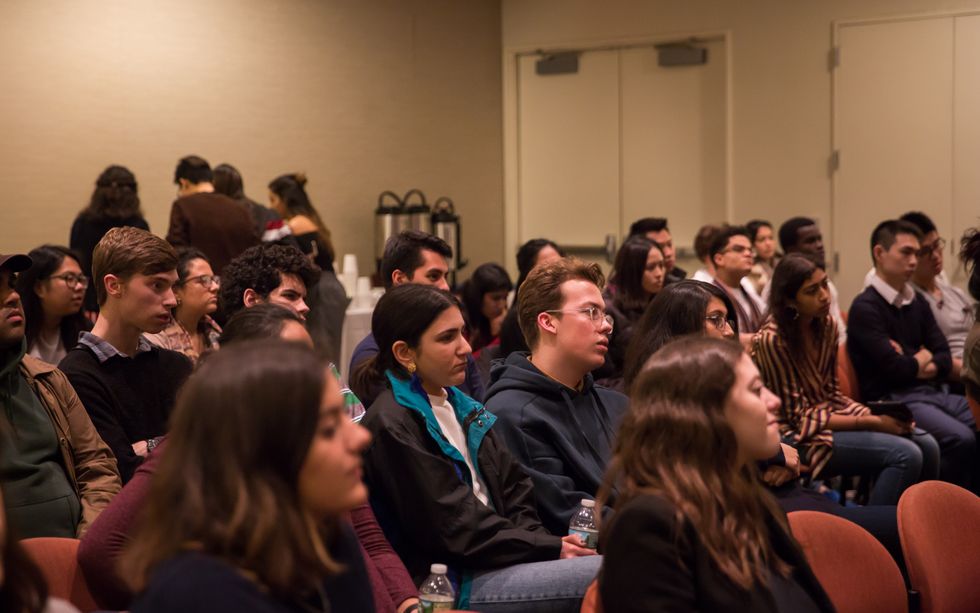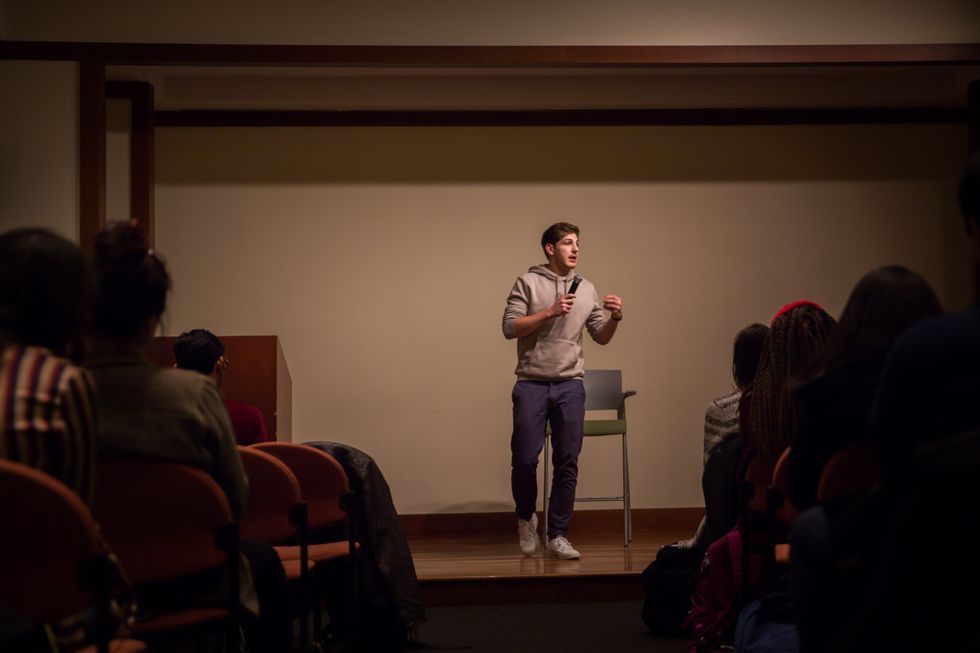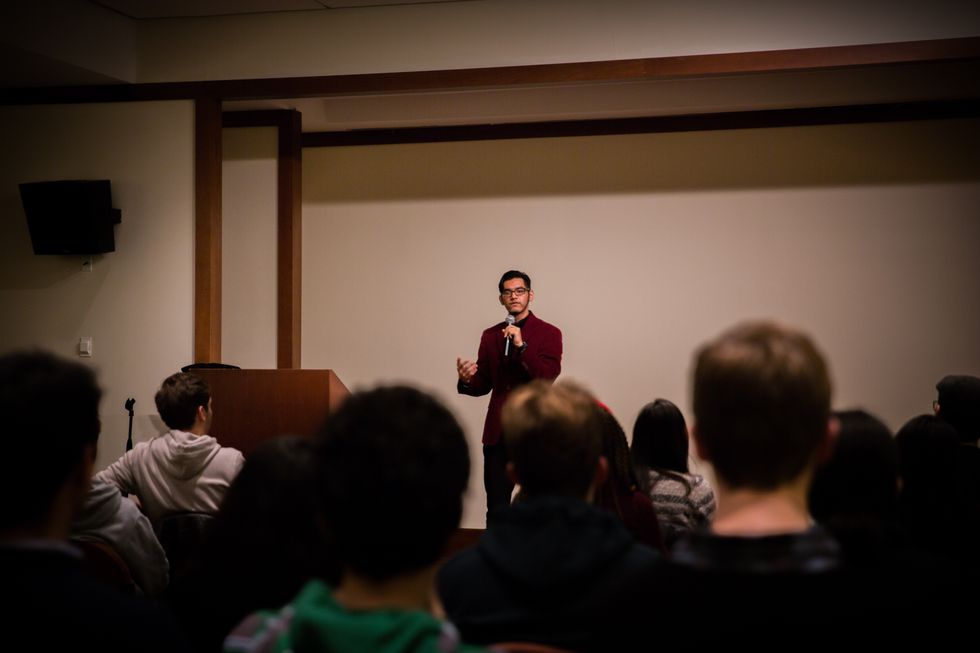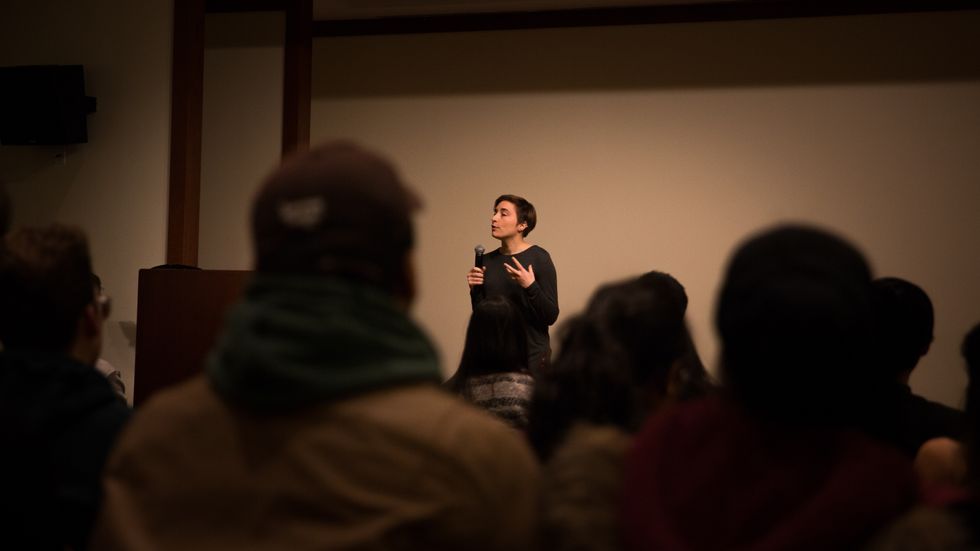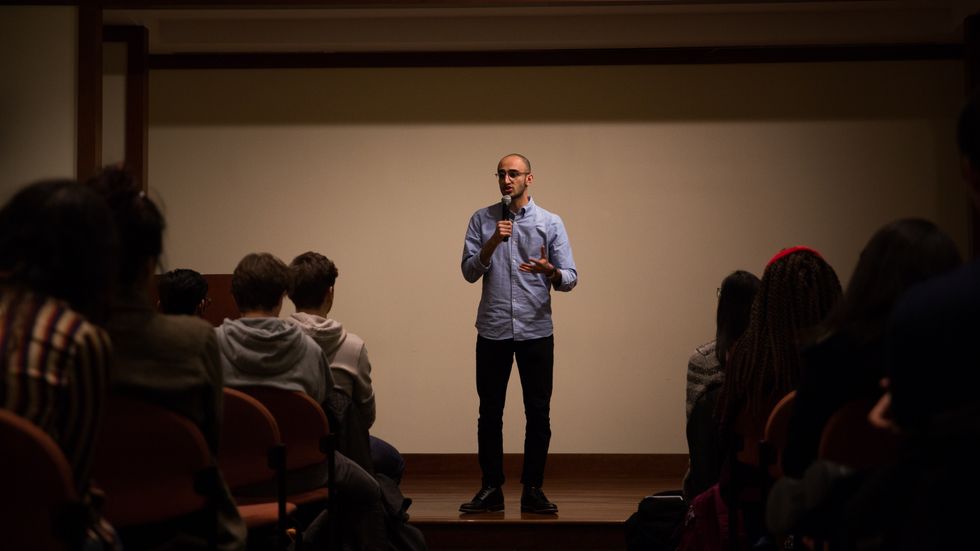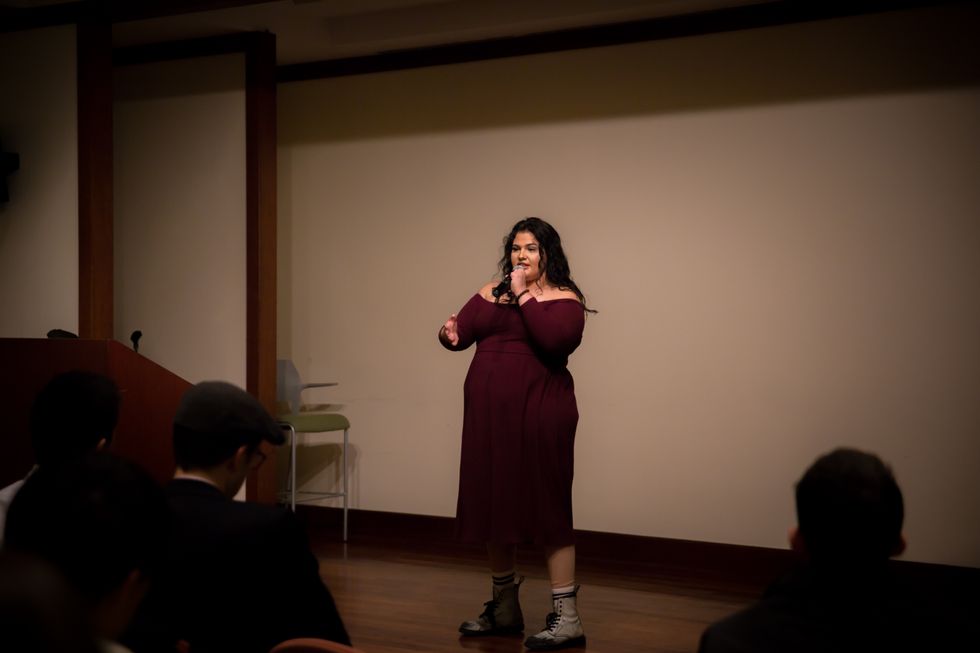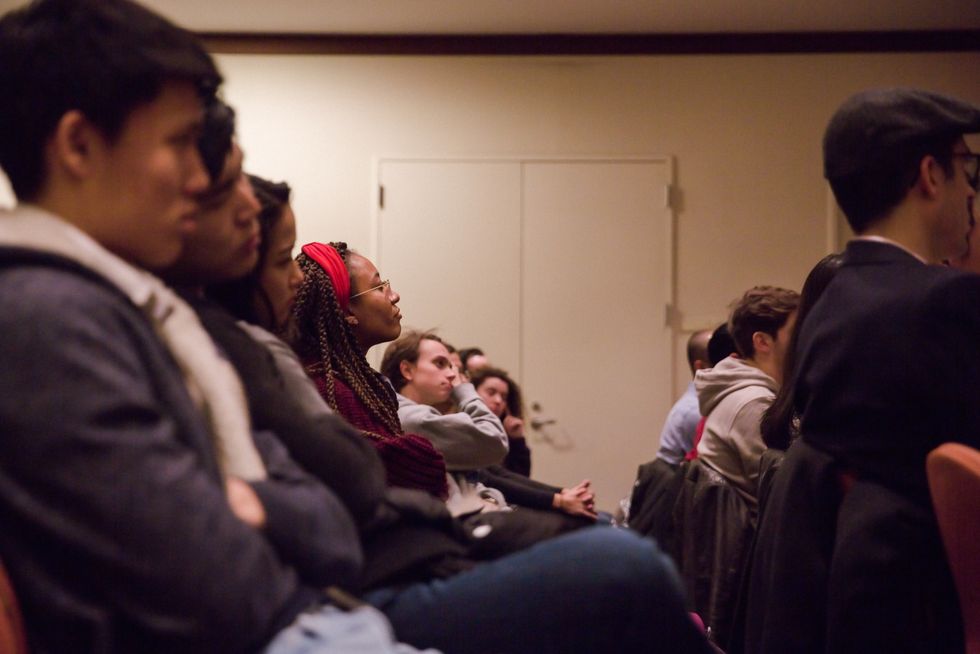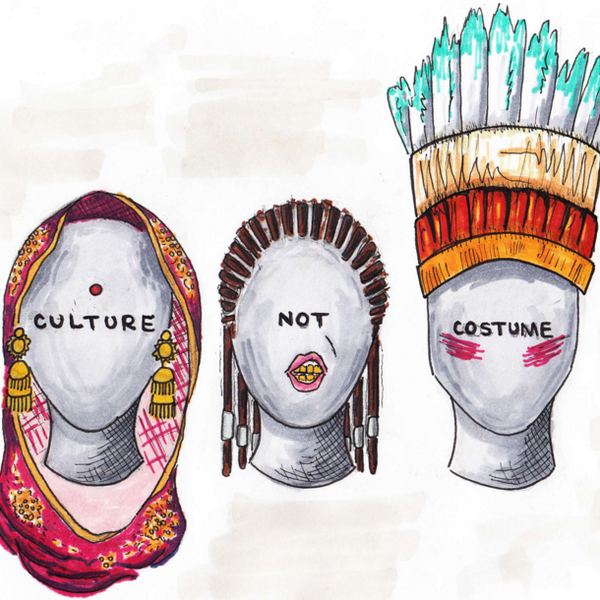This article was co-written By Jaxx Artz and Jenna You.
Every year, TEDxNYU holds a variety of mini-conferences and meetings to educate the NYU community about the most pressing issues of our day. When it’s time for The Pitch to occur in the fall, a handful of students are chosen to present a topic in a short span of time, both to educate the student body and try to win a spot at one of TED’s annual conferences that will occur the following year.
With a population of some of the most creative and innovate minds on college campuses today, it’s difficult to decide who should get the chance to speak at TEDxNYU’s The Pitch, but club leaders did a stellar job in presenting the lineup for 2017. Read below to see what each presenter discussed and find out who was chosen to represent NYU at the next conference!
Jonas Günther, MS Management of Technology, Tandon School of Engineering
“This,” Jonas began, holding up a tomato. “This is the problem with society.”
Did you know that farmers don’t get paid for flavor? It seems obvious, sure, but it is pretty sad that our society favors quantity over quality. This is where urban farming becomes a viable solution.
The thing is, you deserve tomatoes that taste good. Tomatoes that don’t just look pretty, but are refreshing and full of flavor. Jonas stressed that technology is used a lot on our farms today, with a little focus on nature. But what if we could produce the food we want by actually using what nature gives us to aid us in farming today? That’s the future we want, the future we need.
Without pesticides and fertilizers, which already raise questions about how we grow the food that is consumed in our nation, farms can reduce emissions and reduce exploitation through cheap labor. Jonas believes that our future houses whole ecosystems indoors, incorporating fish and algae to “increase the overall agency of the farm.”
Of course, there are areas that need to be worked on, such as infrastructure concerns. Also, biologists need to figure out how this type of farming can become a reality. With some commitment, however, it is possible.
“We deserve tomatoes that do not exploit laborers, do not harm our environments, and taste as juicy as we want."
Mark Yokoyama, Public Policy, CAS
Mark’s speech discussed the importance of artists in society. Why do we make art? What inside of us causes this need to continue a tradition that has been around for thousands of years?
The importance of artwork lies in building a sustainable community and accruing the desire to continue our tradition of art as time goes on. When there is no creative outlet, there is a decrease in social progress.
Art is far too valuable to lose.
Mark brought up his friend Toshi, who fled Fukushima as a nuclear refugee in 2011. Toshi and thousands of others didn’t have a place to go and weren’t given the platform to perform his artwork. He felt this need to rebuild a community, a community of displaced people, through culture. For those who have nothing else, art is the only way.
Therefore, Mark concluded, there must be a place for artists in any kind of urban planning.
Stefanie Giglio, Master's degree in Public Policy, NYU Wagner
Stefanie’s talk concerned an area that will never cease to be a major issue in the world: climate change. She discussed a potential way to combat climate change with high-density cities. Believe it or not, high-density lifestyles have a lot of environmentally friendly aspects to them.
Everyone has a personal carbon footprint to improve. And though you can work on it yourself through a variety of activities, such as heat and electricity conservation, Stefanie believes that moving to high-density cities can make a larger impact in the fight against climate change. It’s not a new idea, according to Stefanie, but it is one of the easiest and fastest solutions to solving climate change.
“Everyone thinks I’m crazy"
And though it sounds crazy, ideas like Stefanie’s are what make TEDxNYU’s The Pitch so special.
RJ Khalaf, Politics, Rights and Development, GLS
RJ’s talk about leadership hit on a notion that all of us are grappling to understand. What is leadership? How do we become leaders?
For RJ, leadership is something that is “different for different people in different situations.” Leaders are not born but made when they are required to do something, to stand up and act as a beacon for those who need guidance.
"The key thing about leadership is that leaders are not born, they are made. Leadership is not reserved for a few, but required of all.”
When you are asked about leaders, you identify military leaders, politicians. But when you change your definition to leadership as love, as a way of bringing a group of people together for a common cause, your definition changes. Now, leaders are teachers, coaches, mentors. Now, leadership is within your grasp.
Around the world, people are struggling. For those who can shift their focus and look at the situation critically, and can see themselves as leaders in the world today, do it. You define what you are, says RJ, and you can be a leader.
Melina Beatrice Nakos, Film and TV, Tisch School of the Arts
To finish the night, Melina spoke about ableism in the entertainment industry. A student of Tisch’s Film and TV at NYU, Melina knows about film. “Film is about getting from point A to point B.”
But when you stop and think for a second about how powerful film is, how it changes the minds of people and can shift perspective, you will realize that depictions of the disabled are lacking. Part of this is about representation.
20% of the world’s population is disabled, but this number is not reflected in the characters we see in movies. And when a disabled character is portrayed, it is usually in a way that is manipulative.
Disabled characters can be used to garner sympathy from an audience, to advance the plot of a story, but rarely to be discussed in its own light. Rarely are disabled characters portrayed accurately.
To use disabled bodies isn’t to give a marginalized community a voice, but to profit off that community.
How do we change this reality when audiences leave the theater with a cookie-cutter idea of disabled people? “The first step is creating an audience that knows how to watch films in an analytical manner.”
Audiences must take responsibility for what the filmmakers have done and dissect it, both to understand and to demand a greater quality when films portray disabled characters. Only then will the conversation be about how to support disabled humans rather than profit off their existence.
TEDxNYU’s The Pitch 2017 was full of amazing discussions in between speakers as a result of their inspiring talks, a catalyst for change. That’s what it’s all about, right?
Nevertheless, there had to be a winner to continue on to the conference in 2018, where the speaker will give their talk to a larger audience in the hopes of inspiring change. The winner is decided by three judges who use their scores for each pitch and audience participation in making their decision.
This year, the talks were too great for there to be just one winner, so the TEDxNYU judges picked two. Stefanie’s pitch about transitioning to high-density cities as a way to combat climate change and RJ’s speech on leadership moved the audience in a way that the NYU community wanted to give them a chance to perfect their speeches even more and try them on a greater platform.
And even though this night yielded two winners, it is amazing to see the kind of spirit we have at NYU. Our classmates, roommates, and friends are great people who have their own ideas about how to spark a movement, incite change. Isn’t that amazing, to be one of such an amazing community?
The next time you’re having one of those dimly-lit nights where you and your friends talk about any and everything, consider checking out TEDxNYU’s facebook page for upcoming events. You never know what can lead a person to greatness until it happens.


